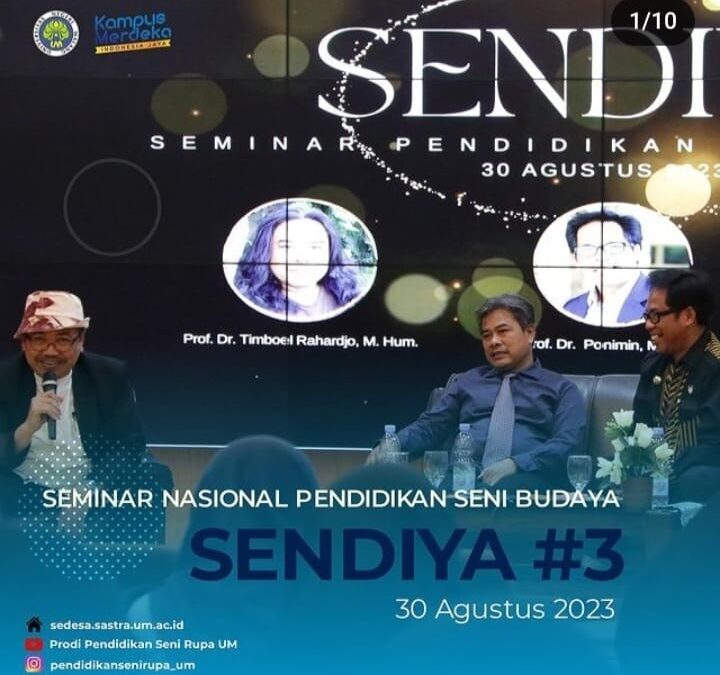Art and culture are integral parts of our society, reflecting our values, traditions, and aspirations. To celebrate and strengthen the discipline of art and design creation as scientific research, the Fine Arts Education Study Program recently organized a National Arts and Culture Education Seminar. The event, held on August 30, 2023, brought together a diverse audience, including students, alumni, art teachers, and members of the public, to explore the theme, “Strategy for Strengthening the Discipline of Art and Design Creation as Scientific Research.”
The seminar, hosted by the esteemed Prof. Dr. Timboel Raharadjo, M.Hum, Rector of ISI Yogyakarta, was a testament to the institution’s commitment to advancing art and culture education. Dr. Raharadjo emphasized the vital role of artistic research in shaping the future of the creative industries and underscored the need to nurture the discipline of art and design as an academic endeavor.
Dr. Djuli Djati Pramudi, M.Sn, a lecturer at UNESA, brought valuable insights into the seminar. He highlighted the importance of integrating art and design into scientific research, emphasizing that creativity and innovation are not limited to the realms of science and technology. Dr. Pramudi’s presentation encouraged attendees to view art and design as powerful tools for addressing societal challenges and generating new knowledge.
The seminar also had the privilege of welcoming Prof. Dr. Ponimin, a distinguished lecturer from UM. Prof. Ponimin’s thought-provoking discussion focused on the fusion of traditional and contemporary elements in artistic research. He stressed that embracing both the rich heritage of our cultural traditions and the ever-evolving contemporary art world can lead to groundbreaking discoveries and artistic expressions.
One of the key takeaways from the seminar was the recognition that art and design are not just about aesthetics but are also potent instruments for critical inquiry. The event fostered a deep appreciation for the interdisciplinary nature of artistic research and how it can contribute to various academic fields and societal advancement.
The seminar’s participants were not limited to the academic community; it also attracted a wide range of attendees from different backgrounds. Students from various universities and art institutions eagerly participated, gaining valuable insights into the evolving landscape of art and design as scientific research.
Alumni of the Fine Arts Education Study Program showcased their achievements, serving as living proof of the program’s dedication to nurturing creative talents. Their success stories served as motivation for current students, inspiring them to push the boundaries of artistic research further.
Art teachers who attended the seminar found the discussions and presentations to be a valuable resource for enhancing their teaching methods. They gained a deeper understanding of how to integrate research-based approaches into their classrooms, ultimately benefiting their students and the art education system as a whole.
In addition to the intellectually stimulating discussions, the seminar provided a platform for networking and collaboration. Attendees had the opportunity to connect with like-minded individuals, fostering a sense of community and shared purpose in advancing the field of art and design as scientific research.
As the National Arts and Culture Education Seminar came to a close, it left a lasting impact on all who attended. It reinforced the idea that creativity knows no bounds and that art and design have the potential to drive innovation, solve problems, and enrich our lives in countless ways.
In conclusion, the Fine Arts Education Study Program’s National Arts and Culture Education Seminar was a resounding success, bringing together a diverse audience to explore the theme of strengthening the discipline of art and design creation as scientific research. The insights shared by distinguished speakers and the enthusiastic participation of students, alumni, and art teachers highlighted the importance of artistic research in shaping our future and advancing our cultural heritage. This event served as a reminder that art and design are not just expressions of creativity but also essential contributors to the intellectual and cultural vitality of our society.


